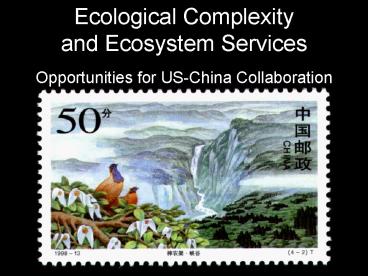Ecological Complexity and Ecosystem Services Opportunities for USChina Collaboration - PowerPoint PPT Presentation
1 / 10
Title:
Ecological Complexity and Ecosystem Services Opportunities for USChina Collaboration
Description:
understanding biocomplexity' speaks to a deeper concept. ... Limnology, disease ecology (Vibrio) Austin Troy. University of Vermont ... – PowerPoint PPT presentation
Number of Views:80
Avg rating:3.0/5.0
Title: Ecological Complexity and Ecosystem Services Opportunities for USChina Collaboration
1
Ecological Complexityand Ecosystem
ServicesOpportunities for US-China Collaboration
2
From Dr. Colwells Address12 October 1998,
Chinese Academy of Sciences
- understanding biocomplexity speaks to a deeper
concept. It is not enough to explore and
chronicle and record the enormous diversity of
the world's ecosystems. We must do that. But we
must also reach beyond, to discover the complex
chemical, biological, and social interactions
that comprise our planet's systems. From these
subtle but very sophisticated interrelationships,
we can pull out the fundamental principles of
sustainability. Our survival as a human species
and the ecological survival of the entire planet
depend on our ability to achieve what is a truly
interdisciplinary task. - Your colleagues and counterparts in America look
forward to an era of joint scientific journeys
with you. In the coming century, partnering in
scientific and technical endeavors will become
even more central, not only to progress of
science but also to the promotion of peace.
3
ECOLOGY
ECOLOGICAL COMPLEXITY ECOSYSTEM SERVICES
MATHEMATICS COMPUTER SCIENCE
ECONOMICS
EDUCATION
4
How Did We Get Here?A complex history
- 1998 Rita Colwell develops concept of
biocomplexity as an NSF area for development. - October 1998 Rita Colwell visits China,
discusses NSF initiatives on biocomplexity
(http//www.nsf.gov/od/lpa/forum/colwell/rc81012.h
tm) - Spring 2001 P. Firth contacts Elser
- August 2001 Elser submits proposal approved
September 2001 - September 11 2001 trip postponed
- Spring 2002 Elser / Phillips / Chang / Firth
renew effort. - Fall 2002 Invitation process begins.
- December 2002 Chinese delegation, incl. Zhang
Zhibin, visits Washington DC, San Diego, and
Tempe to meet with Firth, Chang, Elser, Phillips. - Spring 2003 Team finalized itinerary
finalized. - March 2003 US - Iraq war begins.
- April 2003 Tempe workshop SARS outbreak trip
postponed. - January 2004 Videoteleconference
- May 2004 US team visits China!
5
Primary ThemesDeveloped in Tempe (April 2003)
- Concepts and Definitions articulate operational
working definitions of biocomplexity, ecosystem
services, resilience, and other key concepts. - Scaling of Ecocomplexity and Ecosystem Services
determine how scale of observation (in space and
time) affects our understanding of complexity and
ecosystem services - Interface of the Social and Natural illuminate
methods of economic valuation and natural
resource decision-making used in China and the US
and build Sino-American collaboration in this
area - Broader Impacts identify the ways to achieve
broader impacts from our exchange to the
scientific community and general public.
6
A Challenge to the Worlds ScientistsKofi
Annan, 7 March 2003, Science 299 1485.
- There are deep similarities between the ethos of
science and the project of international
organization. Both are engaged in a struggle
against forces of unreason and strive to give
expression to universal truths for the United
Nations, these include the dignity and worth of
the human person and the understanding that even
though the world is divided by many particulars,
we are united in a single human community.
7
(No Transcript)
8
Matthew Wilson University of Vermont Ecological
economics
Jim Elser Arizona State University Limnology,
ecological stoichiometry
Jingle Wu Arizona State University Theoretical
landscape ecology, urban ecology
Andy Phillips Zoological Society of San
Diego Herpetology, conservation biology
Valerie Eviner Institute of Ecosystem
Studies Soil ecology, biogeochemistry, community
ecology
Kathyrn Cottingham Dartmouth College Limnology,
disease ecology (Vibrio)
Sarah Gergel University of British
Columbia Landscape ecology, river-floodplain inter
actions
David Lodge University of Notre Dame Ecology of
invasive species
9
Shahid Naeem Columbia University Biodiversity
and ecosystem function
Austin Troy University of Vermont Natural
resource economics
Peter Turchin University of Connecticut Theoretica
l population ecology, historical dynamics of
humans
Sara Tjossem Columbia University History of
ecology environmentalism conservation biology
10
Emerging Themes / Focus Groups(As of 3 PM 25 May)
- Invasive emerging species prediction,
description, and quantification of ecological
economic impact. (Dong, Sun, Lodge, Ding, Eviner,
Min Cao, Cottingham, Xie, ?) - Regulation of ecological complexity theory and
tools for multiple scales. (Zhang, Elser, Wu,
Turchin, Mingkui Cao, ?) - Valuation of dynamic landscapes in China and USA
(Wilson, Troy,Gergel, Zhu?, Mingkui Cao, Ouyang
Zhiyun, ?) - New conservation biology biodiversity as cause
and consequence (Phillips, Naeem, Xie, Wei, Zhu
Yongguan?) - Biocomplexity research beyond boundaries
formalization and communication of Sino-US
activities (Tjossem, Firth, Chang, Zhang, Elser,
Cao Jinghua, ?)































